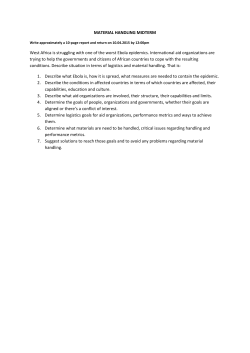
File - Mr Quick Tech
Liberia celebrates the end of Ebola, but people are still on guard By Los Angeles Times, adapted by Newsela staff on 05.14.15 Word Count 685 A woman holds a placard as she and others celebrate Liberia being declared free of Ebola in Monrovia, Liberia, May 11, 2015. Photo: AP Photo/ Abbas Dulleh JOHANNESBURG — Liberia declared it was now free of Ebola, one year after the disease began spreading across West Africa. During the world’s worst outbreak, more people died of Ebola in Liberia than any other nation. The World Health Organization (WHO) warned that neighboring countries in West Africa still struggle with the deadly disease. The risk remains high that infected people could cross into Liberia and spread Ebola all over again. The Disease Spread Quickly Ebola was first discovered in 1976. It is an extremely dangerous and contagious disease. The most recent outbreak began in Guinea in December 2013. Ebola then spread to nearby Sierra Leone and across the border into Liberia. The first case in Liberia was reported in late March 2014. At first, the outbreak was small. But by June, Ebola had hit the capital, Monrovia. It marked the first time Ebola had ever spread to a big city with people living close together. Thousands died. When the outbreak was at its worst in August and September, the country counted 300 to 400 more Ebola patients every week. For a while, health experts feared that the disease would spin out of control and become a horrible new part of everyday life in Liberia. In October, the number of infections finally began to drop. The last victim was buried on March 28, 2015. Many Thousands Died More than 11,000 in Africa are believed to have died from Ebola. More than 4,700, or over one-third, of those people were in Liberia. In Guinea, Ebola killed 2,387 people. Sierra Leone recorded more than 3,900 deaths, according to numbers from the WHO. One reason why the virus spread so rapidly was the large number of people crossing the borders. Also, in West Africa, it is the custom for friends and family members to touch the body before a person is buried. People traveled across borders to attend funerals and returned home with the illness, infecting other family members and neighbors. Many of those who died were health workers, community nurses and healers who treated people without protection. In Liberia, 375 health workers came down with Ebola and 189 died. More than 860 health workers were infected in North Africa and more than 500 died. Treatment Did Not Always Come On Time After someone has been exposed to the virus, it can take up to 21 days to develop symptoms. A country can be declared free of Ebola only after 42 days have passed. Patients often thought they had other illnesses, such as typhoid or malaria. Many of them tragically delayed seeking treatment, infecting others. Treatment centers were swamped with cases, and patients often died at the gates. Often, there was no room inside the overcrowded centers to treat them safely. Taxis bringing sick passengers for treatment may also have spread the disease. Entire families were killed. Sometimes children lost both of their parents to Ebola. To help stop the spread of the virus, schools were closed and public gatherings were banned. Ambulances had a hard time reaching patients. In September, the world was not yet responding to the spreading disease fast enough. At one point, there were almost no hospital beds for Ebola patients available in Liberia, the WHO said. Volunteers Made A Difference Ending Ebola in Liberia was a huge achievement, the WHO said. Liberia's "determination to defeat Ebola never wavered, courage never faltered." Doctors and nurses continued to treat patients even when there were not enough gowns and masks to protect them from the disease. The WHO also gave credit to local volunteers, who worked in treatment centers, on burial teams or as ambulance drivers. They "were driven by a sense of community responsibility and patriotic duty to end Ebola." The WHO said they brought hope back to people. Ellen Johnson Sirleaf is the president of Liberia. She said that it will take a generation for the pain and grief to heal. A U.S. government statement said the world must not let Ebola return to Liberia. “We must not let down our guard until the entire region reaches and stays at zero Ebola cases,” it said.
© Copyright 2025









